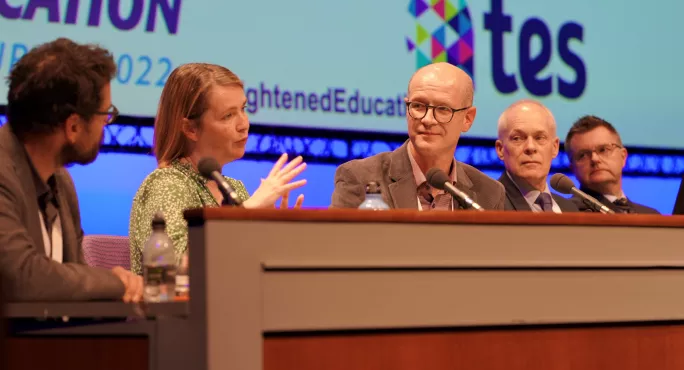What do the different UK education systems do best?

Wales is growing in confidence when it comes to education - something that has been tough in the past partly because of having “such a large, loud neighbour right next door”, according to Kirsty Williams, the country’s former minister for education.
Ms Williams made her comments at a conference in Edinburgh last week when she was representing Wales on a panel - chaired by Tes Scotland editor Henry Hepburn - which was discussing the lessons the four UK home nations could learn from each other.
However, English school leader, Sammy Wright, who was representing England on the panel, argued that “the noise” - and “dynamic pedagogic conversation” - going on in English education currently was actually a strength.
All the panel members were asked what their education system did “particularly well”.
Ms Williams - who served as minister for education in the Welsh government from 2016 to 2021 - said that Wales had successfully worked with teachers, schools and communities to create the rationale for major educational reform.
In September, the new curriculum, Curriculum for Wales, began being introduced in Wales, and Welsh school qualifications are also undergoing reform.
She said the Welsh education system was “increasingly developing a self-confidence”.
Ms Williams continued: “Welsh people grow up with the phrase ringing in their ears that ‘self-praise is no recommendation’. We are a very diffident people and we don’t like to sing our praises, and sometimes, when you have such a large, loud neighbour right next door to you, it is difficult to have confidence in your ability as a nation to do things.
“I think there’s increasing confidence in our sector that we can do things differently, not just for the sake of doing things differently, but because it’s right for our children and young people, our economy and our nation.”
Sammy Wright, deputy headteacher of Southmoor Academy in Sunderland who also served on the Social Mobility Commission, was on the panel representing England. He said that he thought “the noise” in English education at the moment was actually its strength.
He said there was probably too much consensus when he qualified as a teacher over 20 years ago but, more recently, “a very vocal and really quite dynamic pedagogic conversation” had got underway.
He said: “There’s a lot of discussion and debate about what we should be doing in our schools and that actually creates a lot of energy for innovation.
“When I trained 21 years ago, I felt like there was very much consensus and, actually, what is really lovely now is that there’s a sense that through the fire of proper discussion and argument, we are trying to create new ways of doing things.”
- Also from the event: Horrors of slavery should be core part of curriculum, heads told
- Background: ‘Radical reform’ is everywhere in Welsh education
- From the archive: Flying the flag for closer ties between home nations
On the panel representing Scotland was Professor Ken Muir - the former chief executive of the General Teaching Council for Scotland who recently advised the Scottish government on how the reform of key education bodies, like exam body SQA and the inspectorate, should be taken forward.
Professor Muir argued the curriculum, Curriculum for Excellence, was the Scottish education system’s strength. He acknowledged that might be controversial but said he thought that not dictating the curriculum to schools was “the right idea”, and that schools which had been “sufficiently brave” and “embraced that agency” had ended up with “very innovative, creative, bespoke curriculum for the individuals that were in their school”.
He acknowledged, though, that CfE was not an unqualified success and said that he believed Scotland was “still suffering from not preparing the ground well enough for introducing it”.
Representing Northern Ireland was Graham Montgomery, a headteacher and the president of the Association of School and College Leaders (ASCL) Northern Ireland.
He said the key strength of the education system in Northern Ireland was that teaching remained a “well-respected profession” that attracted “top graduates” and had “no real recruitment problem” - although he said retention was starting to be an issue.
Mr Montgomery also pointed out that Northern Ireland had the best GCSE and A-level results, compared with England and Wales.
He said he thought that was probably because of the high quality of the graduates entering the teaching profession - and also because “education is still seen as something to be prized” in Northern Ireland.
However, he also pointed out that there were more young people leaving school with no qualifications in Northern Ireland than in other parts of the UK.
The panel session took place on Friday at the Edinburgh Open Education Conference. It was part of Enlightened Education, a three-day joint conference organised by the Headmasters’ and Headmistresses’ Conference (HMC) and the Independent Association of Prep Schools (IAPS), attended by nearly 1,000 school leaders.
You need a Tes subscription to read this article
Subscribe now to read this article and get other subscriber-only content:
- Unlimited access to all Tes magazine content
- Exclusive subscriber-only stories
- Award-winning email newsletters
Already a subscriber? Log in
You need a subscription to read this article
Subscribe now to read this article and get other subscriber-only content, including:
- Unlimited access to all Tes magazine content
- Exclusive subscriber-only stories
- Award-winning email newsletters



